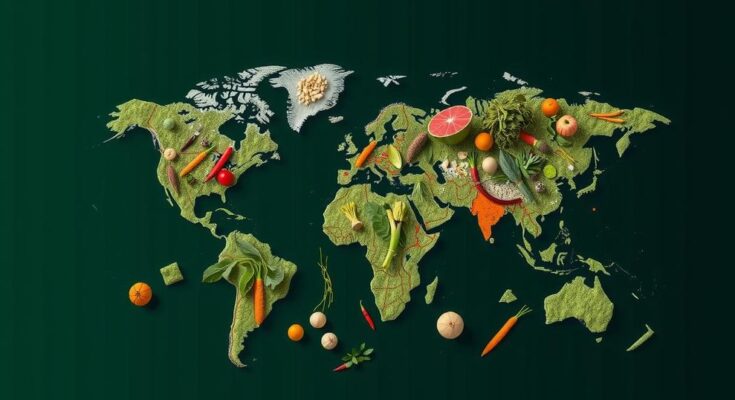A new report reveals that climate change and geopolitical tensions pose significant threats to global food security. Key recommendations include enhancing domestic agricultural practices, minimizing food waste, and fostering cooperation among countries. Given the increase in hunger and reliance on imports, immediate action is necessary to address these challenges and strengthen food systems worldwide.
A new report from the Stockholm Environment Institute and Mistra Geopolitics indicates that climate change and geopolitical tensions significantly threaten global food security. Launched during the Food, Agriculture and Water Day at COP29, the report outlines the necessity for countries to enhance domestic food production, embrace resilient agricultural practices, reduce food waste, and foster collaborative efforts. The study underscores that climate impacts, such as floods and droughts, pose severe risks to food production and trade globally, thus affecting food security. With 59 active conflicts noted in 2023, geopolitical instability further complicates food production and international trade dynamics. The report analyses the relationship between transboundary climate risks and food production amidst geopolitical conflicts, noting that geopolitical conflicts, such as the ongoing war in Ukraine, exacerbate food security issues. Lead author Sara Talebian highlights, “Food trade is being used as a means of power (weaponized) in geopolitical conflicts. However, collaboration among small groups of countries with common goals or shared risks emerges as a potential solution to manage climate risks to food security under increasing geopolitical tensions.” Such collaborative measures could mitigate the cascading effects of climate events on food price stability and accessibility. The report indicates that over 100 million more individuals experienced hunger in 2022 compared to 2019, with projections suggesting that 582 million people will face chronic undernourishment by 2030. Recommendations for improving food security include minimizing food waste, adopting plant-based dietary patterns, and strengthening domestic capacities for climate-resilient agriculture. Ultimately, the authors advocate for adaptable policy responses that cater to future uncertainties while highlighting the need for multifaceted approaches to enhance food security, thereby strengthening global food systems amidst the dual challenges of climate change and geopolitical disruption.
As climate change progresses and geopolitical divisions intensify globally, food security is at significant risk. This precarious situation is exacerbated by ongoing conflicts and trade disruptions, particularly with countries heavily reliant on agricultural imports. The report by the Stockholm Environment Institute sheds light on the interconnectedness of climate impacts and geopolitical factors that jeopardize food production and distribution on a global scale, necessitating collaborative and innovative strategies to ensure food security for all nations.
The report emphasizes the critical need for cooperative strategies to mitigate the risks to food security posed by climate change and geopolitical conflicts. Recommendations such as enhancing domestic food production, reducing food waste, and fostering collaboration among countries are essential for building resilience in global food systems. The rising rates of hunger underscore the urgency of implementing effective solutions to navigate the vulnerabilities inherent in the current geopolitical landscape.
Original Source: news.cision.com




